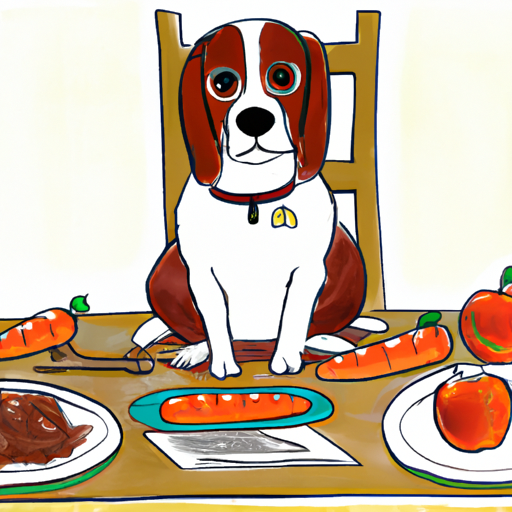As a loving caregiver to your four-legged friend, you’re always looking out for their best interests, especially when it comes to their diet. It’s irresistible when they beg for a bite of your dinner, but is it always safe to share? This guide will help you navigate the world of “people food” that is safe for dogs to consume.
1. Carrots
Carrots are an excellent, low-calorie snack for dogs. They are high in fiber and vitamin A while being low in calories. Raw or cooked, they make a healthy addition to your dog’s diet. Just remember to cut them into bite-size pieces to prevent choking.
2. Apples
Apples are a fantastic source of vitamins A and C, as well as fiber. They make a delicious, crunchy treat for your dog but make sure to remove the seeds and core as they can be hazardous for dogs.
3. White Rice
Cooked white rice can be a good option for a dog with an upset stomach. It’s easy to digest and can help bind stool. However, it’s best to serve it in moderation due to its high carbohydrate content.
4. Fish
Cooked fish like salmon or tuna are packed with beneficial omega-3 fatty acids. These can provide a boost to your dog’s immune system and promote a shiny, healthy coat. Always ensure the fish is cooked thoroughly and remove any bones.
5. Chicken
Cooked chicken is a great source of lean protein for dogs. It’s often recommended as a diet addition for dogs recovering from illness or surgery. Remove any skin and be sure the chicken is cooked thoroughly to avoid any risk of salmonella.
6. Peanut Butter
Peanut butter is a favorite treat for many dogs. It’s a good source of protein and healthy fats. However, be sure to choose raw, unsalted peanut butter and avoid any brands that contain the artificial sweetener xylitol, which is toxic to dogs.
7. Blueberries
Blueberries are a superfood packed with antioxidants, fiber and vitamins. They make a great low-calorie treat for dogs. They can be served fresh or frozen for a refreshing summer treat.
8. Pumpkin
Pumpkin is high in fiber and vitamin A and can help regulate your dog’s digestive tract. Always opt for canned, pure pumpkin and not the sugary, spiced pie filling.
Here is a quick reference table for you:
| Food | Benefits | Precautions |
|---|---|---|
| Carrots | High in fiber, Vitamin A | Cut into bite-size pieces |
| Apples | Source of Vitamins A and C, Fiber | Remove seeds and core |
| White Rice | Good for upset stomach | Serve in moderation |
| Fish | High in Omega-3 fatty acids | Always cooked, remove bones |
| Chicken | Great source of protein | Always cooked, remove skin |
| Peanut Butter | Good source of protein, healthy fats | Avoid brands with xylitol |
| Blueberries | High in antioxidants, fiber, vitamins | None |
| Pumpkin | High in fiber, Vitamin A | Use canned, pure pumpkin |
FAQs
Can I feed my dog fruits and vegetables?
Yes, many fruits and vegetables are safe for dogs to eat. However, some can be toxic, like grapes, onions, and garlic. Always do your research before introducing a new food to your dog’s diet.
Can dogs eat raw meat?
While some advocate for a raw diet for dogs, it can pose a risk of bacterial infections like salmonella or E. Coli. Always cook meat thoroughly before feeding it to your dog.
How much ‘people food’ can I give my dog?
The amount can vary based on your dog’s size, breed, and overall health. It’s best to consult with your vet to create a balanced diet plan for your dog.
What should I do if my dog eats something toxic?
If your dog ingests something toxic, contact your vet immediately or call a pet poison helpline. Symptoms of poisoning can include vomiting, diarrhea, seizures, loss of appetite, and more.
Remember, while it’s okay to treat your dog with people food occasionally, their primary diet should be high-quality dog food. Always consult with your vet before making changes to your dog’s diet and monitor their health closely. Let’s make mealtime, fun, safe, and nutritious for our furry friends!



